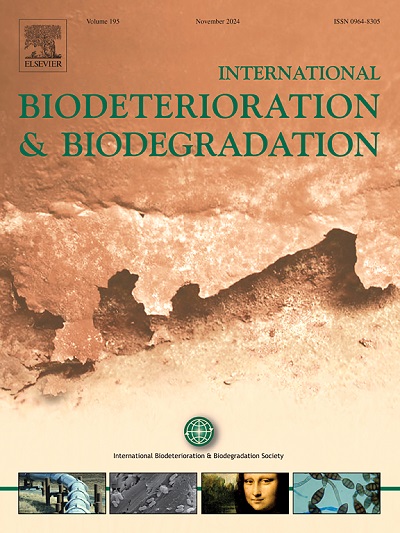优化alperujo堆肥策略加速和提高质量
IF 4.1
2区 环境科学与生态学
Q2 BIOTECHNOLOGY & APPLIED MICROBIOLOGY
International Biodeterioration & Biodegradation
Pub Date : 2025-03-23
DOI:10.1016/j.ibiod.2025.106076
引用次数: 0
摘要
Alperujo (AL)是橄榄油生产的主要副产品,有望应用于循环经济,特别是作为土壤改剂剂。然而,堆肥人工智能面临着挑战,包括设施规模小,过程漫长,通常超过四个月,成本增加,产能有限。本研究评估了13种加速和增强堆肥的处理方法,使用湿重70%的AL与橄榄叶混合作为膨胀剂,以及各种活化剂和促进剂,包括粪肥、生物炭、灰分、橄榄渣、木醋和四种含微生物的商业产品。混合料湿重30公斤。监测温度、湿度、pH、全有机质、全氮、全磷、全钾、C/N比、植物毒性和发芽情况。堆肥的时间从27天到84天不等,鸡粪和灰烬混合物的时间最短,在20天到27天之间。初始pH值及其日增长是优化堆肥效率的关键因素,与较短的持续时间相关(r在- 0.65 ~ - 0.70之间)。牛粪、羊粪和鸡粪的堆肥质量最高,总氮含量均超过2%,碳氮比在14.6 ~ 26.1之间。添加微生物的堆肥对向日葵和豌豆的生物量产量和氮素利用效率分别提高1.43 ~ 1.87倍和1.96 ~ 4.12倍,显示了其对植物发育的支持作用。堆肥,除了那些有灰烬的,符合重金属和多酚的监管限制,确认了它们作为有机肥料的安全性和适用性。优化的AL堆肥混合物可以产生高质量,环保的改良剂,缩短堆肥时间,促进植物生长。本文章由计算机程序翻译,如有差异,请以英文原文为准。

Optimizing alperujo composting strategies for acceleration and quality enhancement
Alperujo (AL), the main byproduct of olive oil production, holds promise for circular economy applications, particularly as a soil amendment. However, composting AL faces challenges, including small-scale facilities and lengthy processes often exceeding four months, increasing costs and limiting capacity. This study evaluated thirteen treatments to accelerate and enhance composting, using AL at seventy percent wet weight mixed with olive leaf as a bulking agent along with various activators and accelerators, including manures, biochar, ash, olive pomace, wood vinegar, and four commercial products with microorganisms. The composting mixture comprised 30 kg wet weight of materials. Temperature, moisture, pH, total organic matter, total nitrogen, phosphorus, potassium, C/N ratio, phytotoxicity, and germination were monitored. Composting duration ranged from twenty-seven to eighty-four days, with chicken manure and ash mixtures achieving the shortest times, between twenty and twenty-seven days. Initial pH and its daily increase were key factors in optimizing composting efficiency, correlating with shorter durations (r between −0.65 and −0.70). The highest-quality composts were obtained with cow, goat, and chicken manure, all surpassing two percent total nitrogen and exhibiting C/N ratios ranging from 14.6 to 26.1. Mean sunflower and pea biomass production and nitrogen use efficiency were between 1.43 to 1.87 times and 1.96 to 4.12 times higher, respectively, for compost enriched with microorganisms, demonstrating their effectiveness in supporting plant development. Composts, except those with ashes, met regulatory limits for heavy metals and polyphenols, confirming their safety and suitability as organic fertilizers. Optimized AL composting mixtures can produce high-quality, eco-friendly amendments, shorten composting times, and improve plant growth.
求助全文
通过发布文献求助,成功后即可免费获取论文全文。
去求助
来源期刊
CiteScore
9.60
自引率
10.40%
发文量
107
审稿时长
21 days
期刊介绍:
International Biodeterioration and Biodegradation publishes original research papers and reviews on the biological causes of deterioration or degradation.

 求助内容:
求助内容: 应助结果提醒方式:
应助结果提醒方式:


